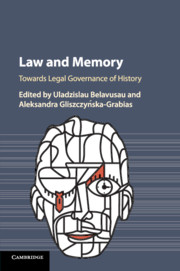16 results
Strategic Lawsuits against Public Participation (SLAPPs), the Governance of Historical Memory in the Rule of Law Crisis, and the EU Anti-SLAPP Directive
- Part of
-
- Journal:
- European Constitutional Law Review / Volume 19 / Issue 4 / December 2023
- Published online by Cambridge University Press:
- 08 March 2024, pp. 642-663
- Print publication:
- December 2023
-
- Article
-
- You have access
- Open access
- HTML
- Export citation
Is It Polexit Yet? Comment on Case K 3/21 of 7 October 2021 by the Constitutional Tribunal of Poland
-
- Journal:
- European Constitutional Law Review / Volume 19 / Issue 1 / March 2023
- Published online by Cambridge University Press:
- 19 January 2023, pp. 163-181
- Print publication:
- March 2023
-
- Article
-
- You have access
- Open access
- HTML
- Export citation
The Judgment That Wasn’t (But Which Nearly Brought Poland to a Standstill): ‘Judgment’ of the Polish Constitutional Tribunal of 22 October 2020, K1/20
-
- Journal:
- European Constitutional Law Review / Volume 17 / Issue 1 / March 2021
- Published online by Cambridge University Press:
- 13 April 2021, pp. 130-153
- Print publication:
- March 2021
-
- Article
-
- You have access
- Open access
- HTML
- Export citation
EU Anti-Discrimination Law beyond Gender, edited by Uladzislau Belavusau and Kristin Henrard [Hart Publishing, Oxford, 2018, 392 pp, ISBN: 978-1-50-991501-9, £60, (h/bk)]
-
- Journal:
- International & Comparative Law Quarterly / Volume 69 / Issue 2 / April 2020
- Published online by Cambridge University Press:
- 16 April 2020, pp. 500-502
- Print publication:
- April 2020
-
- Article
- Export citation
PART III - National Perspectives within the European Union
-
- Book:
- Law and Memory
- Published online:
- 06 October 2017
- Print publication:
- 19 October 2017, pp 149-290
-
- Chapter
- Export citation
Contributors
-
- Book:
- Law and Memory
- Published online:
- 06 October 2017
- Print publication:
- 19 October 2017, pp ix-x
-
- Chapter
- Export citation
Introduction
-
-
- Book:
- Law and Memory
- Published online:
- 06 October 2017
- Print publication:
- 19 October 2017, pp 1-26
-
- Chapter
- Export citation
Index
-
- Book:
- Law and Memory
- Published online:
- 06 October 2017
- Print publication:
- 19 October 2017, pp 435-448
-
- Chapter
- Export citation
PART II - European Law (Council of Europe and the European Union)
-
- Book:
- Law and Memory
- Published online:
- 06 October 2017
- Print publication:
- 19 October 2017, pp 89-148
-
- Chapter
- Export citation
PART I - International Law
-
- Book:
- Law and Memory
- Published online:
- 06 October 2017
- Print publication:
- 19 October 2017, pp 27-88
-
- Chapter
- Export citation
PART IV - Perspectives beyond the European Union
-
- Book:
- Law and Memory
- Published online:
- 06 October 2017
- Print publication:
- 19 October 2017, pp 291-412
-
- Chapter
- Export citation
Copyright page
-
- Book:
- Law and Memory
- Published online:
- 06 October 2017
- Print publication:
- 19 October 2017, pp iv-iv
-
- Chapter
- Export citation
Acknowledgements
-
- Book:
- Law and Memory
- Published online:
- 06 October 2017
- Print publication:
- 19 October 2017, pp xi-xii
-
- Chapter
- Export citation
Contents
-
- Book:
- Law and Memory
- Published online:
- 06 October 2017
- Print publication:
- 19 October 2017, pp v-viii
-
- Chapter
- Export citation

Law and Memory
- Towards Legal Governance of History
-
- Published online:
- 06 October 2017
- Print publication:
- 19 October 2017
Freedom of Religion versus Humane Treatment of Animals: Polish Constitutional Tribunal’s Judgment on Permissibility of Religious Slaughter: Judgment of the Constitutional Tribunal of Poland of 10 December 2014, K 52/13
-
- Journal:
- European Constitutional Law Review / Volume 11 / Issue 3 / December 2015
- Published online by Cambridge University Press:
- 01 December 2015, pp. 596-608
- Print publication:
- December 2015
-
- Article
- Export citation



